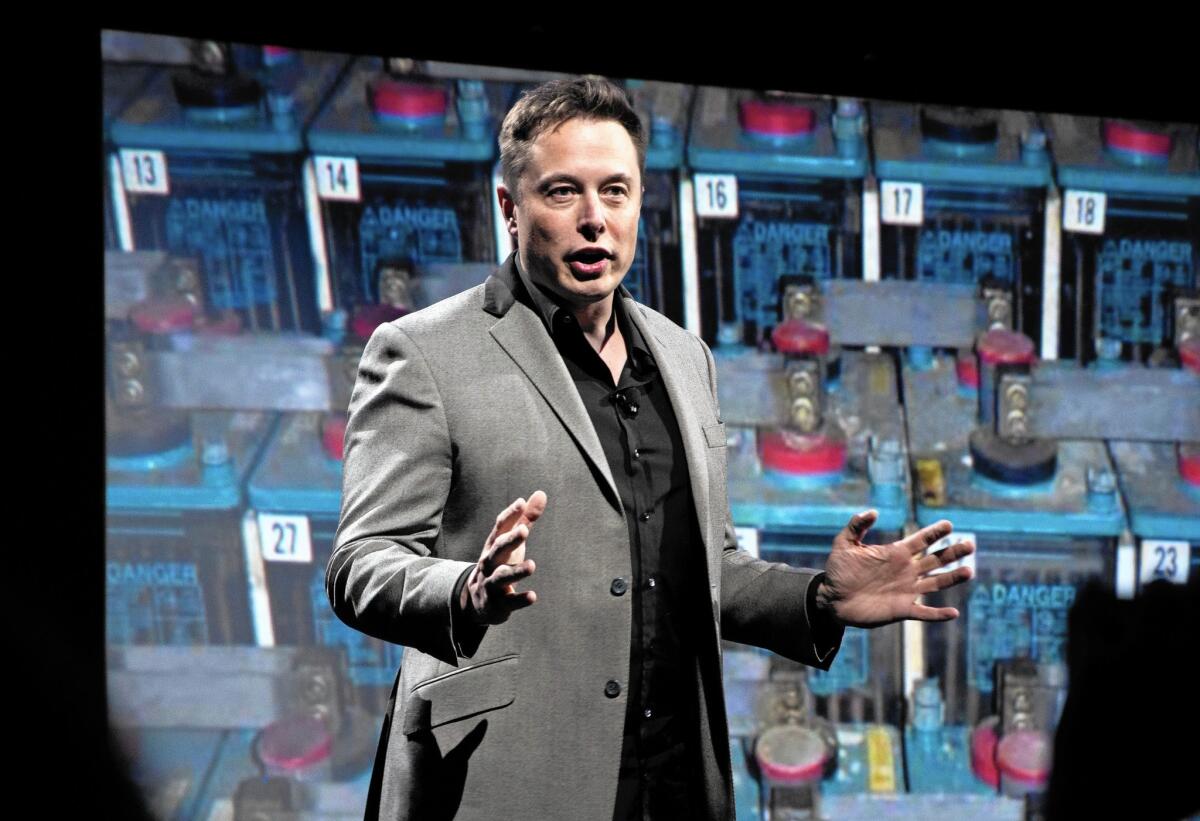Batteries to power O.C. office buildings

- Share via
Orange County’s largest landlord is installing battery-powered energy systems at more than a dozen office buildings as part of a state initiative to combat global warming and rebuild capacity lost when the San Onofre nuclear power plant was shut down.
Irvine Co. plans to install the systems — which would use batteries purchased from Elon Musk’s Tesla — to provide electricity during periods of peak demand, typically hot summer days when tenants turn up their air conditioners.
The systems, which charge up during periods of low use when electricity is cheaper and more abundant, are expected to be installed on about 15 buildings in Irvine and Newport Beach.
SIGN UP for the free California Inc. business newsletter >>
They would provide Southern California Edison with up to 10 megawatts of reserve capacity, enough electricity to power 10,000 homes — what an expert said is the largest project of its type.
“It’s like a virtual power plant,” said Rich Bluth, Irvine Co. vice president of energy management.
The project stems from a target set two years ago by the California Public Utilities Commission to have utilities bring 1,325 megawatts of additional storage online by 2024. That is more than half the capacity of the San Onofre plant, which was shut down three years ago.
Irvine Co. is installing the systems as part of a larger joint-development agreement that Edison has with Advanced Microgrid Solutions, a start-up energy-storage developer in San Francisco, and SunEdison, a renewable energy developer and financier based in suburban St. Louis.
That agreement is supposed to deliver 50 megawatts of energy storage for Edison, a subsidiary of Edison International in Rosemead. The agreement was announced in July, but not the partnership with Irvine Co.
Dave Pogue, director for corporate responsibility at CBRE Group, said the Irvine Co. project is the largest energy-storage project he is aware of in the commercial real estate industry.
“This is a big deal,” he said.
The market for energy storage is expected to grow, in large part because of the PUC mandates.
NEC Energy Solutions of Westborough, Mass., already completed a project in Orange this summer to build a 2.4-megawatt battery-storage system for Edison that can supply 500 to 750 homes.
The larger Irvine Co. project will involve installing the Tesla battery systems at each office building in about the footprint of five parking spaces. Irvine Co. is providing the space but will pay nothing for the service, according to Bluth.
Advanced Microgrid has an ambition to be a big player in the energy-storage market.
The company is led by CEO Susan Kennedy, a former PUC commissioner and chief of staff to Govs. Gray Davis and Arnold Schwarzenegger. It was co-founded by Jackalyne Pfannenstiel, a former chairwoman of the California Energy Commission and a Pacific Gas & Electric executive.
It received $18 million in venture capital funding this year from DBL Partners, a San Francisco firm that also has invested in Tesla. And in June it announced a deal to buy 500 megawatt-hours’ worth of battery storage from Tesla, which opened a business unit the previous month to sell its batteries to utilities, homeowners and other companies.
“This is the grid of the future. This is the beginning of a grid transformation,” Kennedy said,
Pogue said Irvine Co. is more willing to try new technologies than other commercial landlords because it is privately held and holds properties for the long term.
If the project proves successful, more risk-adverse landlords may also use the technology.
“Their experience can help advance this and prove that it can work,” he said.
Bluth said there is no firm commitment to install batteries at buildings beyond the initial 15, but Irvine Co. is interested in expanding the use of such peak-reducing technology to other markets, including San Diego and Northern California.
“This is the first big wave,” he said. “I think more will come.”
Twitter: @khouriandrew
Staff writer Ivan Penn contributed to this report.
MORE BUSINESS NEWS:
Scandal-hit VW to change diesel emissions technology
